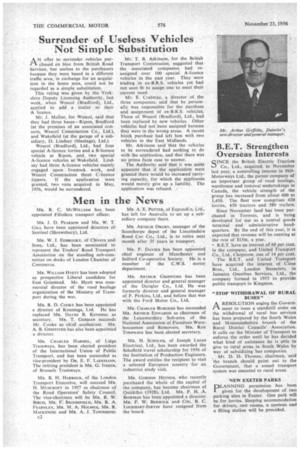Surrender of Useless Vehicles Not Simple Substitution
Page 42

If you've noticed an error in this article please click here to report it so we can fix it.
AN offer to surrender vehicles purchased en bloc from British Road Services, but useless to the purchasers because they were based in a different traffic area, in exchange for an acquisition in the home area, could not be regarded as a simple substitution.
This ruling was given by the Yorkshire Deputy Licensing Authority, last week, when Wescol (Bradford), Ltd., applied to add a trailer to their A licence.
Mr. J. Mellor, for Wescol, said that they had three bases—Ripon, Bradford (at the premises of an associated concern, Wescol Construction Co., Ltd.), and Wakefield (at the garage of a subsidiary, D. Lindsay (Haulage), Ltd.).
Wescol (Bradford), Ltd., had four special A-licence lorries and a B-licence vehicle at Ripon, and, two special A-licence vehicles at Wakefield. Lindsay had three A-licence vehicles mainly engaged upon livestock work, and Wescol Construction three C-licence tippers. If the application were granted, two vans acquired in May, 1956, would be surrendered.
Mr. T. B. Atkinson, for the British Transport Commission, suggested that the associated companies had reassigned over 100 special A-licence vehicles in the past year. They were trading in ex-B.R.S. vehicles yet had not seen fit to assign one to meet their current need.
Mr. E. Crabtree, a director of the three companies, said that he personally was responsible for the purchase and assignment of ex-B.R.S. vehicles. Those of Wescol (Bradford), Ltd., had been replaced by new vehicles. Other vehicles had not been assigned because they were in the wrong areas. A recent block purchase had left him with two vehicles in the East Midlands.
Mr. Atkinson said that the vehicles to be surrendered had nothing to do with the application, and that there was no prima facie case to answer.
The Authority said that it was quite apparent that if the application were granted there would be increased carrying capacity, for which the applicants would merely give up a liability. The application was refused.
















































































































